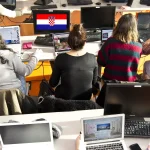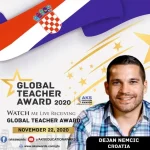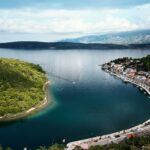The Croatian education system starts with childcare or formally with the preschool year. While the earliest that children can be enrolled is at six months in jaslice (Croatian term for nursery), the mandatory aspect of education typically starts at the beginning of the year before the start of primary school at the age of 6 and lasts until the age of 14. Secondary and higher education in Croatia are accessible to all but not mandatory. There are both public and private education institutions at every level. The academic year in Croatia usually starts in early September for primary and secondary education or October for higher education. It ends in early June for primary and secondary levels, while at the higher education level, it sometimes extends to the second half of July.
Childcare and preschool
As mentioned above, the earliest a child can be enrolled in childcare is at six months old, though that depends on the specific institution. In most places, local authorities will have a system of benefits or subsidies for parents, especially those with more than one child. English is taught in most Croatian kindergartens, while international kindergartens with programmes in foreign languages (German, French, Italian, Spanish) can, for now, only be found in Zagreb and Split. Preschool education is mandatory and free of charge for all children in the year just before they start primary school.
Primary school
Children start primary school at 7 or 6 if they turn seven before the 31st of March of the following year (that same academic year). Primary school is split into two levels and lasts eight years. Grades 1-4 are oriented towards class teaching, where there is one main teacher who covers the base subjects (Croatian, mathematics, art, social), while subject teachers for foreign languages, computer science, and religion come in to teach their specialised subjects usually for one or two classes per week.
The second level of primary education, grades 5-8, is oriented toward subject teaching. The pupils are still organised into classes and allocated a teacher responsible for class admin, but specialised subject teachers teach all the subjects. Subjects like geography, history, and biology are introduced in grade 5, while chemistry and physics are introduced in grade 7.
Specific inclusive programmes are set up for children with learning disabilities, which are either adjusted or individualised to fit their needs.
Secondary education
The secondary level of education typically starts at the age of 14, while the duration depends on the type of programme. There are two main types in Croatia, grammar schools and vocational schools.
Grammar schools are further specialised into those with a general or classical programme, those which focus more on natural subjects, or those with a focus on languages. Programmes in all grammar schools typically last four years and enable the students to pursue higher education.
Vocational schools, on the other hand, equip students for a specific profession. The duration depends on the programme, where programmes for trades typically last between one and three years, hospitality and tourism programmes last three years, economy and computer science last four years, and nursing school lasts five years. After graduating from a vocational school, students can either pursue higher education or enter the job market with the qualification they acquire.
When it comes to primary and secondary programmes in foreign languages, just as is the case with childcare, international schools exist in Zagreb and Split.
Higher education
One of the best aspects of life in Croatia is that higher education is free for all. The public education system of universities, colleges, and polytechnics is very well developed and follows the European Higher Education framework based on the Bologna Process. The requirements for enrollment depend on the specific programmes, but the base is a points system that accounts for the student’s final grades during all years of secondary education and a state exam at the end. All students who wish to study at public higher education institutions must pass the mandatory subjects – Croatian, English, and mathematics, and they can choose to sit for the supplementary subjects which might be required or bear extra credit for specific fields (e.g., biology and chemistry for medicine). When it comes to programmes in foreign languages, alongside language studies, several universities have started offering public programmes in English, like those in Zagreb, Split, and Rijeka. A vast network of private higher education institutions also exists in Croatia, offering various programmes.
Inclusive special education
Croatia has a developed inclusive education system for children with developmental and learning difficulties, starting with childcare. Depending on the extent of their needs, they might be enrolled in mainstream classes where they are approached with programmes tailored specifically for them or have a learning assistant assigned. On the other hand, they might be directed toward a specialised school which, in some cases, they can attend until the age of twenty-one.
Art and music
Another aspect of education regulated by law is official art (dance) and music education. Primary music school lasts six years, and children from the age of 7 can be enrolled. Secondary music school lasts four years and can be taken as the only programme of secondary education. More often than not, though, students attend music school parallel to another secondary school. Primary dance school lasts four years, and so does secondary dance school, which can also serve as the only secondary programme.
For more, make sure to check out our dedicated Lifestyle section.











